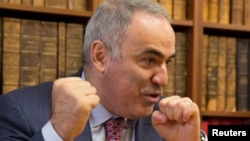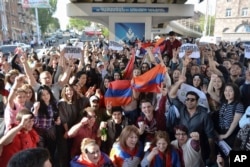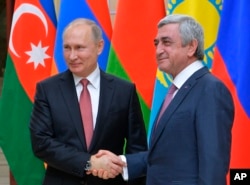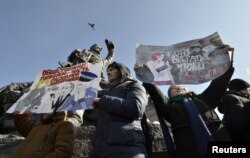Former world chess champion Garry Kasparov is today one of the most renowned figures of the Russian opposition and was the organizer of the recently concluded Free Russia Forum in Vilnius. In an exclusive interview with Voice of America's Russian service about the latest dramatic events in Yerevan, he said that the will of the people in Armenia for change was a key factor in the development of the situation in that country.
"History is not over, but there is one very important lesson we can learn from there: When people are lied to, they get tired of it; when they are ready to defend their freedom and their right to choose who will lead them, power retreats," said Kasparov, who is half-Armenian. "The main lesson is that it's a demonstration of the unity of the nation. When we see students, workers, priests, some in the military [participating in the protest], it makes it impossible for the authorities to suppress it by force."
Armenian Prime Minister Serzh Sargsyan resigned unexpectedly Monday after days of protests against him by opposition supporters who claimed he was clinging to power after serving the maximum 10 years as president.
Armenia's turmoil deepened Wednesday as tens of thousands of people took to the streets after the opposition accused the ruling Republican Party of refusing to cede power following Sargsyan's departure. Later in the day, the Armenian Revolutionary Federation, the Republican Party governing partner, announced that it had quit Armenia's ruling coalition, calling for the election of a prime minister with "the people's confidence."
Domestic focus, honest elections
In a region dominated by "strongman" politics, the grass-roots demonstrations, which protest leaders have been careful not to paint as pro-Western or anti-Russian, are focused on a domestic agenda led by honest elections.
Armenia, which seceded from the Soviet Union in 1991, has, like neighboring Caucasus nations, struggled to overcome the legacy of central planning and remains dependent on Russia for aid and investment.
But Kasparov believes that prevailing conditions in Armenia are nonetheless specific to that country.
"It is a special situation there: a practically monoethnic state, three decades of war — one day sluggish, another day turning into a more acute phase," he said. "There is the Karabakh clan [Karabakh military], and there is the Yerevan party — that is, there are many specific factors that do not apply to Russia."
The opposition figure also noted that Russia's powerful influence on the situation in Armenia continued. Russia, which maintains a military base in the country, has said that it is "very attentively observing what is happening in Armenia," but ultimately considers the unrest a domestic issue.
On Wednesday, Russia's Foreign Ministry issued a statement calling on political forces in Armenia to engage in dialogue and act within the law to resolve the situation. They also dismissed any parallels to events that inspired Ukraine's 2014 Maidan revolution.
The United States responded to developments by thanking Sargsyan for his many years of service and called for a transparent democratic process to determine his successor.
Russian influence
"Armenia is effectively under the all-powerful influence of [President Vladimir] Putin's Russia, and it is clear that the majority of enterprises are one way or another controlled by Russian oligarchs. These ties were formed over a very long time, including military ties," Kasparov said. "Armenia, unlike Ukraine, has no borders with the West. It is trapped between Azerbaijan, Turkey; Iran, Georgia are also there; you can't go too far [without reaching] either Turkey or Russia, if we talk about the border."
Nevertheless, according to Kasparov, Sargsyan's resignation is a bellwether for Russia.
"Today, the whole world is in motion. Revolutionary changes are taking place everywhere," he said. "Many of them are negative and destructive, but it is clear that we have entered a period of change. Armenia, I think, is a bellwether, showing that attempts to preserve the situation in Russia, attempts to return to the past ... all the same end with a revolutionary explosion. Armenia is simply this bellwether indicating that change is inevitable. And the question is how peaceful and nonviolent these changes will be.
WATCH: Armenia's 'Velvet Revolution' Prompts Comparisons With Ukraine, Georgia
"Armenia has avoided, largely due to its national peculiarity, bloodshed and violent confrontation/ The extent to which this is possible in Russia is difficult for me to say. I fear that we missed the possibility for such a peaceful, nonviolent transition in 2011-2012, and that the changes in Russia will, of course, be more volatile."
Thus, he said, it is necessary to prepare for such changes.
"It is necessary now, it seems to me, to think about what will happen in Russia when the day comes that patience completely runs out," Kasparov said. "Why will that happen? There are landfills that make it impossible to breathe, corruption is monstrous, a sharp deterioration in living standards, banking collapses. There are many examples in history when such a combination of factors produced this explosive combination. And what needs to be done, I think, is what we talked about at the last Free Russia Forum in Vilnius: We need to prepare for this moment in order to propose a plan of action."
Darker outlook for Russia
While former Soviet republics such as Armenia may see long-term political changes emerge from this week's protests, Kasparov believes that the situation in which changes could arrive in Russia is less favorable than the collapse of the Soviet Union.
"We cannot again, as in 1991, be caught by surprise. That will be unforgivable," he said. "Because if at that time it was unexpected — and any change then seemed good — then today Russia has no such window of opportunity. There is no such upside. There was still economic and industrial potential then, but today the situation is different. It is much worse. Russia is mired in corruption, industrial devastation and wars. And its international reputation is actually much worse than it was 27 years ago. And society does not have the potential for change, the desire to make the country better, the desire to become part of the civilized world."
"The most important task now is to talk seriously about constitutional reform, about what Russia should look like, what will be the path of this transition," Kasparov said. "We have our own economic, political, social and foreign policy factors, and we need to take them all into account in order to have a sufficiently well-articulated program of action that can be proposed. The person that offers a program of action — even if it is, as articulated, radical in the opinion of many — is usually the one that inspires the people to follow."
This story originated in VOA's Russian Service.









